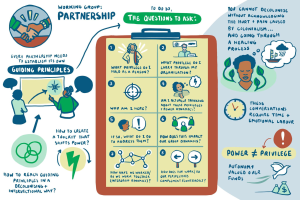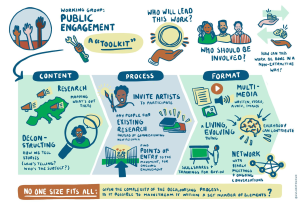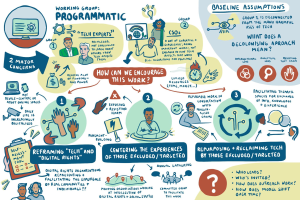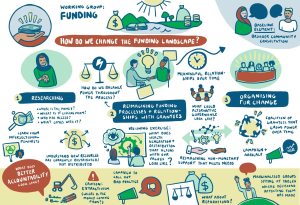Decolonising Digital Rights: a process imbued with love
This blog reflects on the end of the design phase of the decolonising digital rights in Europe process. It discusses our learnings and the next steps of the process as we begin to build and disseminate the programme.
This blog reflects on the end of the design phase of the decolonising digital rights in Europe process. We discuss learnings and the next steps of the process as we begin to build and disseminate the programme. For more about previous aspects of the process so far, take a look at our blog posts from the outset of the process, and from the first, second, and third plenary meetings.
From June to December 2022, the working groups (Partnerships, Funding, Organisational, Programmatic, and Public Engagement) had time to develop their activities for the programme. This last phase started with an online “mapping the gaps” session in September, during which each working group had the opportunity to give feedback on the other groups’ theories of change. We also took the time to discuss in smaller groups where there were potential connections and where there was a need to link with others s on specific parts.

In October and November, the working groups also had the opportunity to meet in-person to build on their collective work- three of them did so, holding meetings in Berlin, Brussels and Amsterdam. This was one of the explicit next steps´ asks formulated at the end of the third plenary, held in Italy in June 2022.
During that time, as process facilitators (the staff at DFF and EDRi who provide the logistical and planning support for this process), we planned the fourth and final plenary in Essaouira, Morocco. This last plenary aimed at deepening the trust and connection among participants and celebrate the closing of the design process, creating space to share remaining hesitations, dilemmas, and questioning regarding the elements. It was also meant to be a space to start assembling the programme, see the coherence between the ideas of the different working groups, map the remaining gaps and collectively determine the next steps and agree a process for finalising the drafting of the programme.
While organising this plenary, we were again confronted with specific, colonial forms of exclusion due to the visa application process. While the European citizenship holders in the group were either exempt from obtaining a visa to enter Morocco or could simply request one online, all those with an African citizenship, regardless where they resided, had to go through a long, opaque process, including the requirement for some to travel to neighbouring countries in order to make an application in person. Some never received a response and were therefore unable to join the meeting.
Plenary, December 2022: off to Essaouira
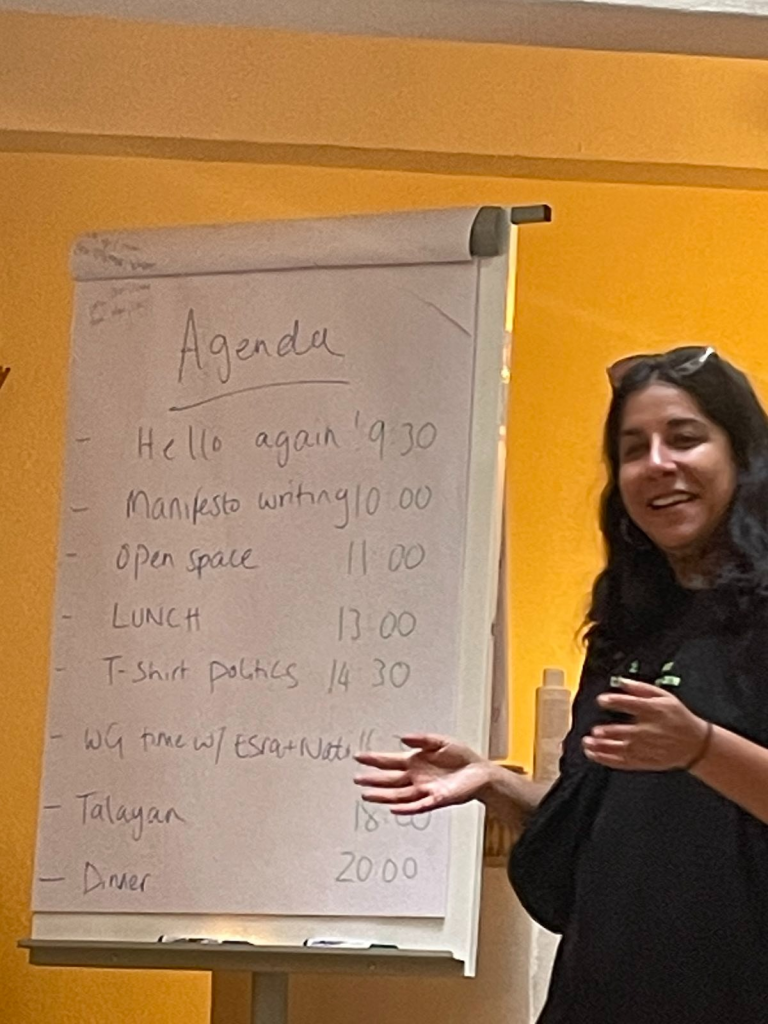
The plenary was a week long, deliberately longer than previous meetings in order to enable participants the space to come together and connect as a group.
The first two-days had open sessions planned for the working groups to use as they saw fit. We also used that time to visit a nearby womens’ argan oil cooperative.
Again, time was intentionally carved out for creativity and collective wellbeing. During the previous plenary in Italy, following a sentence a participant said, the words “that should be put on a t-shirt” were often pronounced. All those sentences and many others had been turned into a poem during the open-mic on our last night in Chivasso.
We took this invitation literally and in Essaouira, Alice Z. Jones organised a T-shirt making workshop for the group where we printed these slogans using wax and local dyes.
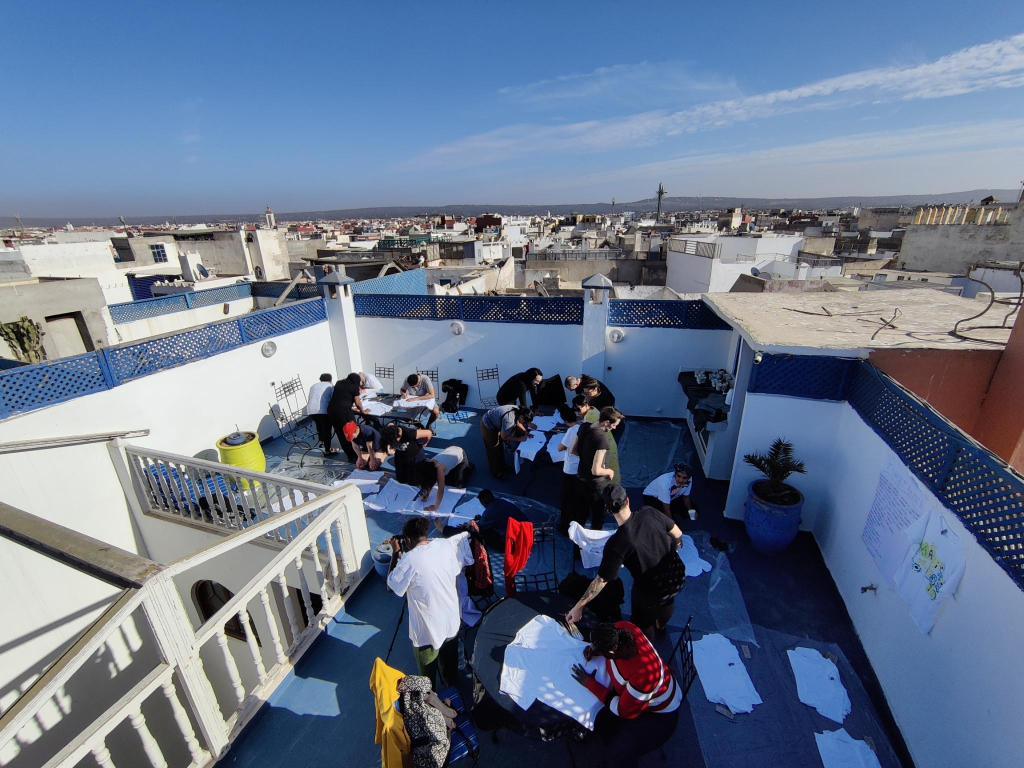
We also had a creative writing session, during which we wrote a manifesto for the process – embracing the artistic, political and spiritual invocative power of manifestos. These were moments of creative joy and mutual discovery – allowing us to hear and see each other under new suns.
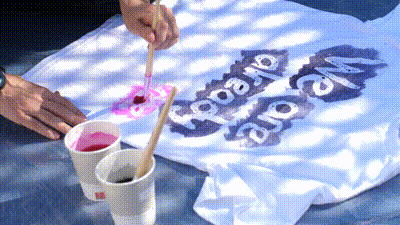
Over the week, we also connected with Talayan, a trans-led collective of Moroccan sex-workers, some of whom joined the plenary for the duration. Finally, on the last day, we took the time to go for hike along the coast of Essaouira.
Working on the programme
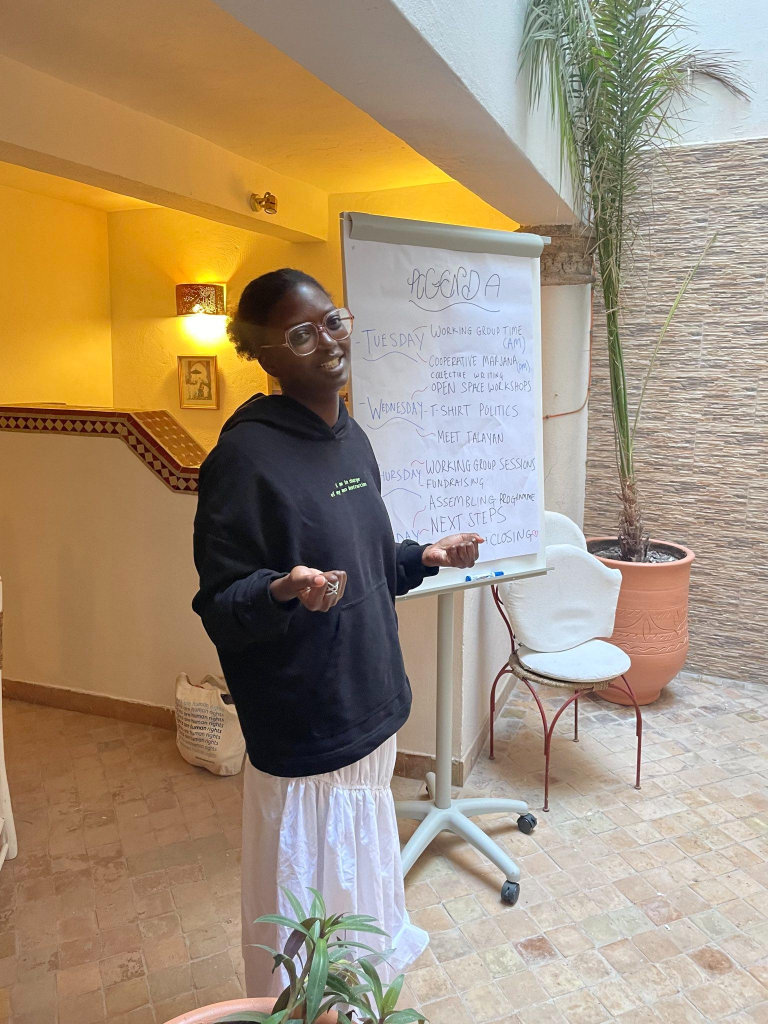
The participants had opportunities on the Wednesday to hold sessions on topics they felt were relevant to the process, sessions such as “indicators for shifting power”, “organising against white resistance” and “racial trauma and activism work” took place. On the Thursday, each working group facilitated an hour long session presenting their elements for the programme and organising break-out sessions to collect feedback.
As the sessions unfolded, we witnessed the programme coming into shape before our eyes. Questions and excitement filled the riad, as we engaged in figuring out “how do we make sure the resources really get redistributed?”, “how can we mitigate cooptation here?”, “how do we recognise and compensate the work that has already been done?”, “how do we not create another mechanism that exhausts or silences radical voices?”. We were at that moment a world within a world, with the particular energy flow which arises when change feels attainable.
Click on the visuals below to check out our visual session recordings
Attempting to walk the talk
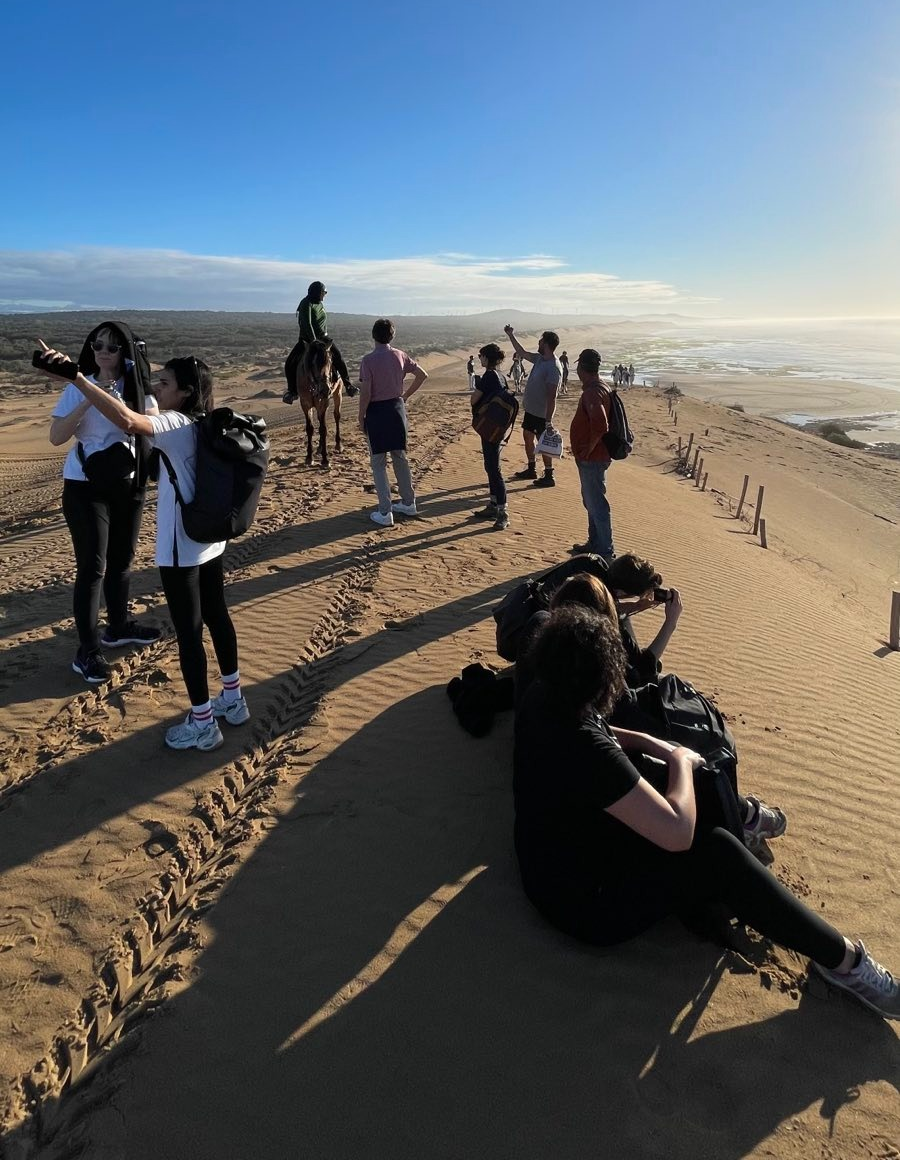
On the evening, we went to a restaurant called “Le Love by Caravane”, hoping to have a nice and pleasing night after a long day of work. Upon entering the space we were confronted with objectifying images of Black bodies, reminiscent of colonialism and slavery. There were sculptures spread all other the place, including sculptures of young Black boys in serving positions, used as lamps, and sculptures of Black women half-naked. The latter echoing the dangerous stereotype of the Jezebel, used under slavery to negate the possibility for Black women to be victims of rape, presenting them as creatures with insatiable sexual appetite.
These images, which to this day impact the rights of young Black boys to be children and of Black women to live in a world safe from gendered violence, were put as decoration in a chic local for mostly Western tourists´consumption, hereby loudly echoing colonial realities in which Black bodies were displayed for the consumption, distraction and profit of the colonisers, denying Black people the possibility of agency, even on the African continent.
We decided to leave. The altercation that followed, with some staff members and the white French owner of the restaurant, deepened the wound with racist and transphobic sentiments being voiced as well as physically threatening attitudes.
As a collective, we took care of each other, with recognition of how this racist moment affected us all differently.
What we had planned for the last day was to assemble the programme all together. This felt very secondary in the moment. It nonetheless meant for us, as process facilitators, the need to let go of what we had envisioned and planned for the final day. We had to reckon with the discomfort that these colonial realities felt like a ‘distraction’ from ‘business as usual’. This discomfort comes from the pressure of having to produce, to perform productivity, in order for our work to be valued in the current world. We felt that we had failed the participants and the process.
Recognising and attempting to move away from this allowed us to upturn our agenda and simply make space for processing and healing. Instead of continuing with the designing work we had planned, we took the final day to reflect and plan what we might do to resist. One of the participants invited us to hold two different spaces, one for BPOC to digest the event, one for the white people. The white people in the group gathered on the roof of our riad to plan how they wanted to react, discussing questions of responsibility to colonial legacies and solidarity, while the BPOC group had a space to unpack the different dimensions and triggers of what happened the night before, also in relation to anti-Blackness in racialised communities.
Our experience in Essaouira mirrored multiple, overlapping colonial dynamics and legacies. From the barriers to travel placed on members of our group due to racist border and visa policies, to the racist and gendered experiences in restaurants and other public spaces, to the privileged, class access many Westerners in the group experienced, we realised we could and should not expect our process to be somehow outside of these realities.
Recognising this as organisers helped us to see the ‘diversion’ from our planned course less as a failure or an anomaly but rather exactly as the product of the racist, colonial world we are contesting. Whilst we weren’t advancing as quickly as we hoped toward our programme, we did find ourselves closer to a shared community, and building a process imbued with care and with love.
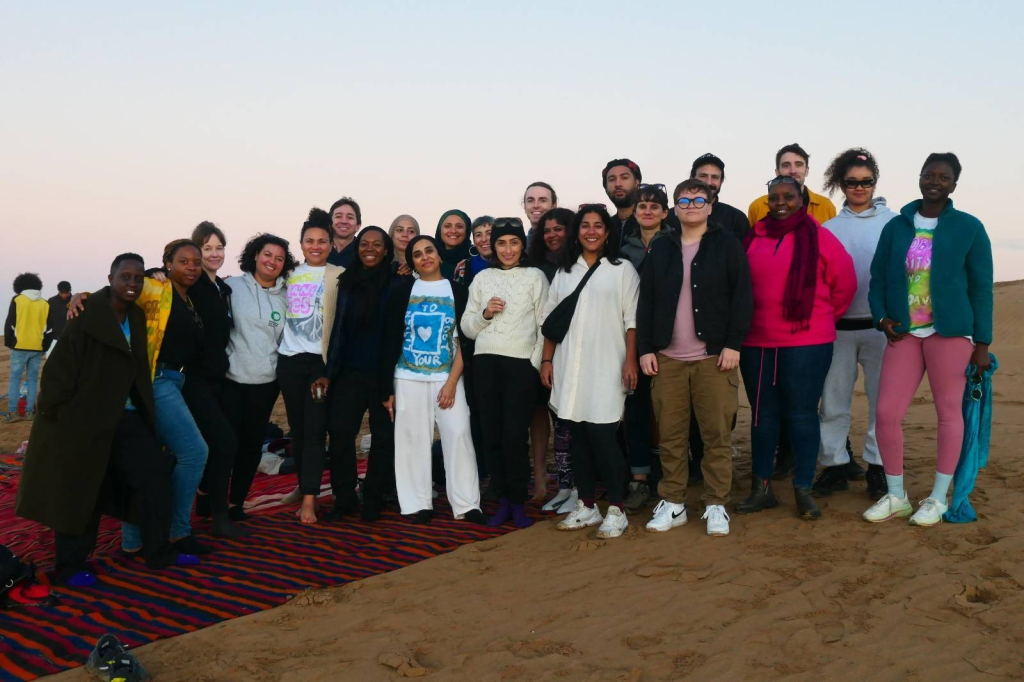
The deeper one immerses themselves in an anti-colonial ethos, the more unbearable the violence of our colonial reality becomes. Engaging truly with anti-colonial dreaming means realising all that is intolerable about what is present now- again, and again, and again. It also makes it oh so clear how different everything could be. There are more generous and loving worlds to build. This is a result and a necessary step of such work.
It also requires us to create practices to take care of those emerging emotions, the new internal and external conflicts they create and the new dimensions of colonial collective traumas which demand to be dealt with. This meant for us in that moment to act in alignment with the programme we were building and walk the talk, as much as we could. It became impossible to detach who we are as people from what we were doing as a group. As we were calling to centre community-building in all parts of the programme, we ourselves were going through a crucial community-building moment.
The process of ‘creating a place’: On imagining, on building
One outcome of our collective design process is the decolonising programme – a programme of activities we as a group propose to initiate structural change in the digital rights field in Europe. Our method of building was to propose activities, structures and processes of change that we would like to see happen to address the structural imbalances in the digital rights field.
In order to do this, we needed to ‘create a place’ for imagining. The entire decolonising process, rather than simply critiquing how digital rights work in Europe is currently organised, has been about building an alternative space. In order to have the space to imagine, we have first had to focus on building understanding and community between the participants involved, each bringing their own ‘organising baggage’ to the group; their own histories, hopes, ideologies, pain and expectations.
Only then were we able to start imagining how digital rights work could be different.
Rarely do social justice movements get the space to reflect, to re-imagine, to rebuild. That’s why this has been such a demanding process, we have been forced not only to critique our movements, but to examine our own practices and try to build otherwise. What would we put instead of this space, this world, this field, organised with certain power dynamics? What would that look like? How to create anew? How do we make dismantling a system that oppresses us sustainable and open, a dismantlement in which joy and healing have their place?
"[W]e create the conditions for our everyday lives by organizing ourselves and materials and environmental resources. And, in putting those things together—sometimes institutionally as states or corporations or communities or unions, and sometimes in more free-flowing ways, let’s say, how mutual aid societies work—what we’re doing is we’re creating a place."
What’s next? Recording, Iterating, Transitioning
Seeing this work not as a linear project but instead as a process has required us to try to find some comfort or poetry in incompleteness.
We have now worked on a first draft of the programme, which will be going through a consultation process to expose and build into the gaps, deepen certain points and re-interrogate and revise others. This consultation will take the form of conversations, targeted feedback as well as an open format to allow everyone who will be so kind as to share their constructive opinions.
We are also working on a blueprint. As we were designing this process, few documents were available online that describe practically how to design a collaborative process using an anti-colonial framework. This scarcity of information doesn’t reflect the reality of how many such initiatives have taken place but rather the unequal representation of such information online. The blueprint will aim at helping tackle this deficiency and support the sharing of practical knowledge surrounding such processes. It will be a how-to-guide of the process including explanation of the different roles, the overall architecture, and the guiding principles as well as the learnings. It will share what worked well, what we will do differently in the future and advice for organisations, collectives etc. who would wish to go on a similar journey.
One ongoing reflection in a process like this is how do we constantly shift power, not just asking that question of others, but also of ourselves. We acknowledge that EDRi and DFF are not the best fitted to lead this process on the long run. Although both our organisations have initiated processes of organisational change, we know that organisations that have a long tradition and extended knowledge and practices of anti-colonial, anti-racist, queer, transfeminist, anti-capitalist organisational work are the ones who are best place to bring it further. Whilst DFF and EDRi would like to remain part of this transformation, we understand the need to shift power, considering the place our organisations occupy in the field.
Again, it is about walking the talk. This was mentioned during one of the discussions of the plenary, with clear demands from participants for a transition plan which both allowed for a shift of power towards such organisations but didn’t drop everything on them all at once – acknowledging that transitions take time and must be thought through and organised to be successful.
Therefore, we are asking ourselves the very same questions we ask in the programme – how to shift power? How to reallocate resources? How to make space and leave leadership to other organisations? But also, how to make sure that transitioning doesn’t mean disengaging or pushing away responsibilities?
Looking forward, we will create a transition plan for how this work will be collectively implemented and owned. Our hope is that the fruits of this cooperative design can continue to engage more communities and organisations, especially those most affected by digital discrimination, surveillance and extraction.
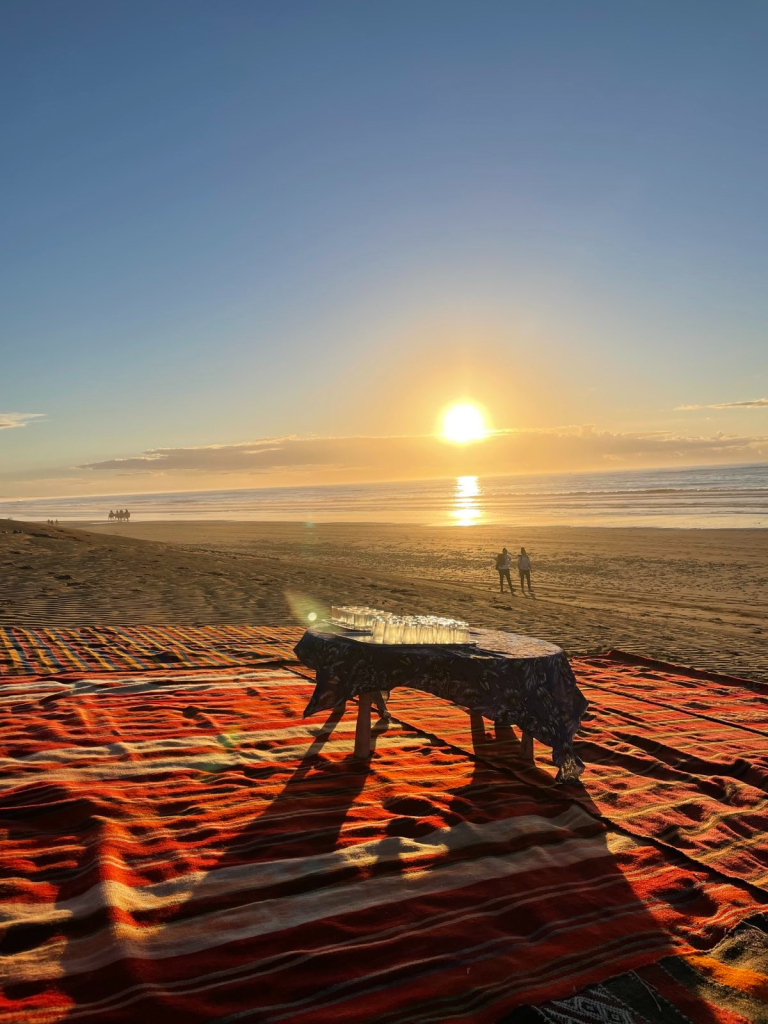
The decolonising digital rights in Europe process is a collective design process with the aim of building a decolonising programme for the digital rights field in Europe. The programme seeks to address power dynamics in the field and imagine a vision for anti-colonial digital futures. The process was initiated in 2020 by former DFF Director Nani Jansen Reventlow and joined by EDRi, with 30 participants from the digital rights field and social, economic and racial justice groups.
Contribution by: Sarah Chander, Senior Policy Advisor, EDRi and Laurence Meyer, Social and Racial Justice Lead, Digital Freedom Fund
Photos from Claire Fernandez, Chris Jones, Joel Hide, Eleftherios Chelioudakis and Salmana Ahmed.
Graphic recording : Lulu Kitololo

